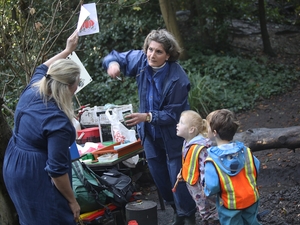-

1 November 2024
Specialist help for pupils at Brading is vital
Brading C of E Primary is one of three Church of England schools that the ... read more
-

30 October 2024
Green spaces mean so much to Oakfield pupils
Our diocese is opposing plans by the Isle of Wight Council to close three CofE ... read more
-

28 October 2024
Parents and children full of love for Arreton Primary
Parents and children can't stop talking about how much they love Arreton St George's C ... read more
Bishop urges council to pause school closure plans

BISHOP Jonathan has urged council leaders to pause plans to close six Isle of Wight schools, in order to reconsider other solutions.
The bishop today submitted his response to proposals by the Isle of Wight Council to close six schools – including three Church of England primaries – to deal with an issue of surplus places.
He has asked for Oakfield C of E Primary in Ryde, Arreton C of E Primary and Brading C of E Primary to remain open because he believes closure would damage vulnerable communities and reduce parental choice – by removing a church school as an option.
Both Bishop Jonathan and our diocese’s Board of Education are opposing the council’s proposals, arguing that all C of E schools offer a distinctively Christian ethos – and that there are specific reasons for all three C of E schools to remain open. They believe each of the schools makes a significant contribution to their communities, supporting many vulnerable children and their families.
Bishop Jonathan said: “Church of England schools offer something vital and distinctive that could easily be lost. They aren’t there to fill our pews or force religion onto people, but to serve their local communities, welcoming those of all faiths and none who come through their doors.
“I wish to resist the proposal to close Arreton, Brading and Oakfield C of E schools. I believe there will be damaging, unintended consequences on the wider economies. There is an unfounded presumption that families possess the finance and mobility to transport children to other schools. This is transparently not the case.
“There is also the disproportionate impact on Church of England schools – three of the six named are C of E. And for two of the schools named, the suggested destination schools are not church schools. I would urge a pause, for significant reconsideration.”
Bishop Jonathan indicated that diocesan staff had no prior knowledge of which schools would be earmarked for closure by the council, and no warning that the council might indicate alternative uses for all three school sites.
“The use of land owned by the Diocesan Board of Education (DBE) is not a matter for the council to determine,” he said. “Any use of our land and schools would have to be approved by the DBE and with the support of the diocesan bishop. In the absence of consultation, I cannot imagine a situation where I would give my support.”
The bishop supports the initiative to increase provision for children with special needs on the Isle of Wight. In that context, he said he was dismayed to discover which schools were named, as all three C of E schools already deliver specialist, well-received and integrated provision for children with special needs.
“My education team will be delighted to work with the local authority to expand such provision in all three of our schools in specific and creative ways,” he said. “I am confident that a way can be found to address the question of surplus places, built on proven SEND provision, and which achieves demonstrable financial benefit for the school.”
Any individual, or group, or PCC is also entitled to respond to the Isle of Wight Council’s consultation process before November 1, and you can have your say here.